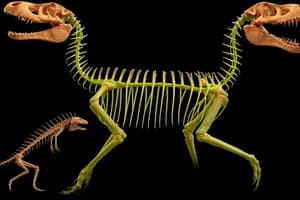Podcast
Questions and Answers
प्राकृतिक चयन क्या है?
प्राकृतिक चयन क्या है?
- यह व्यक्तियों को समर्थन और प्रजनन के प्रक्रिया के आधार पर गतिशील होता है
- यह जनसंख्या में समर्थन और प्रजनन की प्रक्रिया के आधार पर गतिशील होता है (correct)
- यह जनसंख्या में आवंटित जीनों का प्रकारतम तरीके से बदलना है
- यह जनसंख्या में नए संविधानों को विकसित करता है
म्यूटेशन क्या है?
म्यूटेशन क्या है?
- यह व्यक्ति की संरचना में परिवर्तन होता है
- यह जीनेटिक सामग्री में परिवर्तन होता है, जिससे संगणकों की विशेषताएँ परिवर्तित होती हैं (correct)
- यह जनसंख्या में समर्थन और प्रजनन की प्रक्रिया से सम्बंधित होता है
- यह वंशानुक्रम में जीनों का पारंपरिक परिवर्तन है
जीन प्रवाह क्या है?
जीन प्रवाह क्या है?
- इससे नए जीनों का नुकसान होता है
- यह मुद्राओं के प्राचल में परिवर्तन होता है
- यह चेहरे के संरचना में परिवर्तन होता है
- यह जीनों के मुकाबले में स्थानांतरण होता है (correct)
जूलॉजी क्या अध्ययन करता है?
जूलॉजी क्या अध्ययन करता है?
पारस्परिक गलतफहमी क्या है?
पारस्परिक गलतफहमी क्या है?
प्रकृति में जीवों के प्रकार के संबंध में किसका अध्ययन होता है?
प्रकृति में जीवों के प्रकार के संबंध में किसका अध्ययन होता है?
प्राचीन जीवनक्रिया के संरचना का अध्ययन किसके प्रकार में होता है?
प्राचीन जीवनक्रिया के संरचना का अध्ययन किसके प्रकार में होता है?
जनसांख्यिकी परिवर्तन के लिए कौन-कौन से कारणों की व्याख्या की गई है?
जनसांख्यिकी परिवर्तन के लिए कौन-कौन से कारणों की व्याख्या की गई है?
जीनेटिक ड्रिफ्ट क्या है?
जीनेटिक ड्रिफ्ट क्या है?
प्राकृतिक चयन की मुख्य क्षमता क्या है?
प्राकृतिक चयन की मुख्य क्षमता क्या है?
Flashcards
What is zoology?
What is zoology?
The study of animals, their behavior, classification, and evolutionary history.
What is evolutionary biology?
What is evolutionary biology?
A subfield of biology that studies the mechanisms and processes behind the diversity of life on Earth.
What is natural selection?
What is natural selection?
A key mechanism of evolution where advantageous traits become more common in a population over generations.
What is mutation?
What is mutation?
Signup and view all the flashcards
What is gene flow?
What is gene flow?
Signup and view all the flashcards
What is genetic drift?
What is genetic drift?
Signup and view all the flashcards
How does natural selection work?
How does natural selection work?
Signup and view all the flashcards
What is the role of mutation in evolution?
What is the role of mutation in evolution?
Signup and view all the flashcards
How does gene flow impact evolution?
How does gene flow impact evolution?
Signup and view all the flashcards
What is the effect of genetic drift on evolution?
What is the effect of genetic drift on evolution?
Signup and view all the flashcards
Study Notes
Introduction
Zoology is a branch of biology that studies animals, their behavior, classification, and evolutionary history. It is the scientific discipline that focuses on the study of animals, their characteristics, and their relationships to other organisms. The study of zoology encompasses a wide range of topics, including animal physiology, behavior, ecology, and evolution. In this article, we will delve into the fascinating world of zoology, with a particular focus on the subtopics of evolutionary biology.
Evolutionary Biology
Evolutionary biology is a subfield of biology that focuses on the study of the mechanisms and processes that drive the diversity of life on Earth. It seeks to understand how species evolve over time and how they are related to one another. Evolutionary biology is concerned with the study of evolutionary processes, such as natural selection, mutation, gene flow, and genetic drift, as well as the study of the fossil record and the comparative anatomy of different species.
Natural Selection
Natural selection is a key mechanism of evolution, driven by the process of survival and reproduction. It occurs when certain genetic traits become more or less common in a population over time depending on their impact on fitness. Individuals with advantageous traits are more likely to survive and reproduce, passing on their genes to their offspring. Over many generations, this process can lead to the evolution of new species.
Mutation
Mutation is the process by which genetic material is altered, resulting in changes in the traits of an organism. Mutations can occur spontaneously or can be induced by environmental factors such as radiation or chemicals. Some mutations are beneficial, others are harmful, and some have no effect on the organism. Mutations play a crucial role in the evolution of species, as they provide the raw material for natural selection to act upon.
Gene Flow
Gene flow is the movement of genes from one population to another, typically through the migration of individuals. Gene flow can have a significant impact on the evolution of species, as it can introduce new genetic variation into a population. This can lead to the development of new traits and the adaptation of populations to changing environments.
Genetic Drift
Genetic drift is a random process that occurs when the frequency of certain genes in a population changes due to chance events, such as the death of an individual carrying a particular gene or the birth of an individual without that gene. Genetic drift can lead to the loss of genetic diversity within a population and can play a role in the evolution of species.
Conclusion
Zoology is a fascinating field of study that offers insights into the diverse and complex world of animals. Evolutionary biology, a subfield of zoology, helps us to understand the processes that drive the development and diversification of species over time. Through the study of natural selection, mutation, gene flow, and genetic drift, we can gain a deeper appreciation for the intricacies of the natural world and the incredible adaptability of life on Earth.
Studying That Suits You
Use AI to generate personalized quizzes and flashcards to suit your learning preferences.




